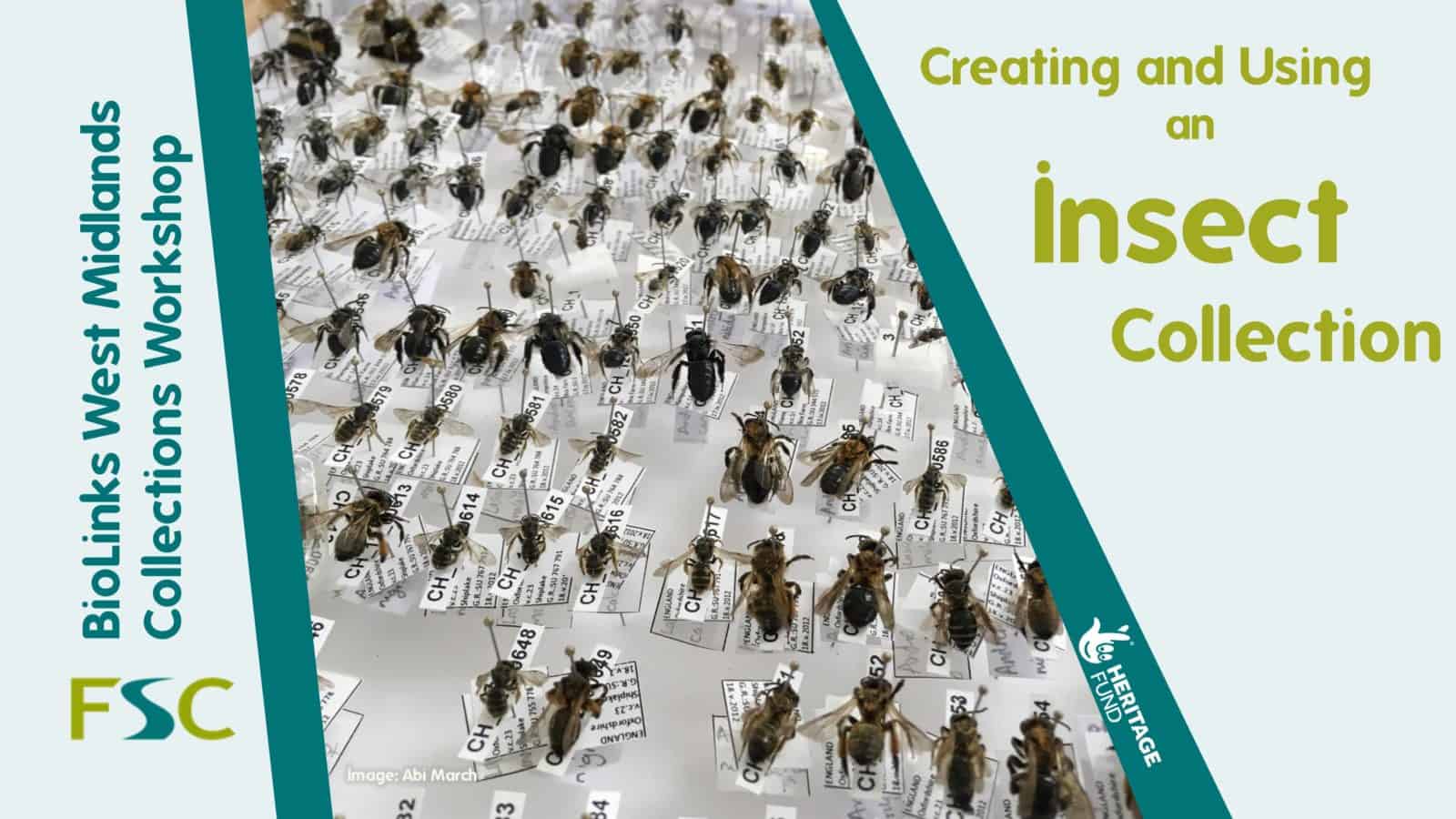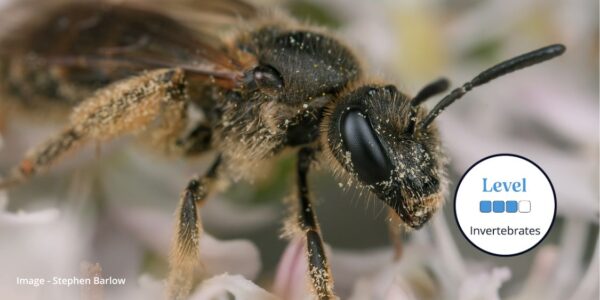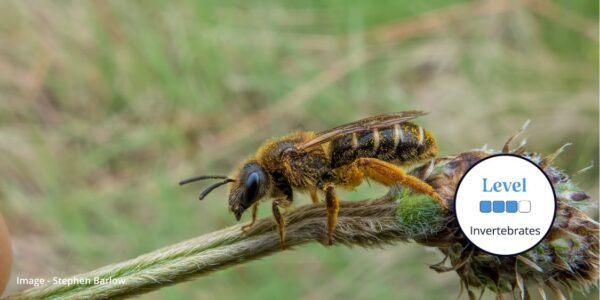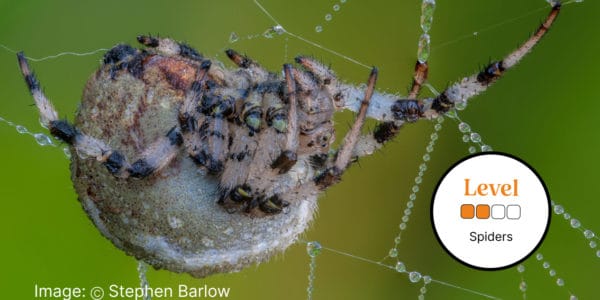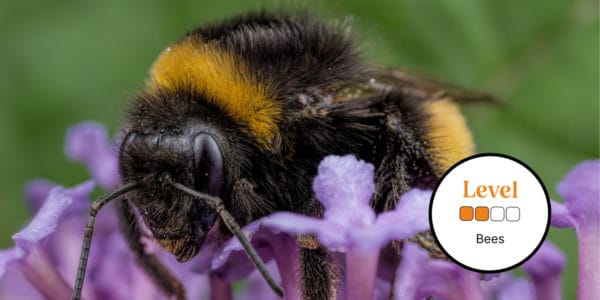Many museums house vast invertebrate collections which are used to help reliably identify both existing and new to science species and are an invaluable tool for taxonomic research.
However, insect collections are not restricted to museums, and many biological recorders both collect and store reference specimens to help compare morphological features, come to reliable identifications and aid in the mapping of species distributions. A personal reference collection can be a fantastic resource for insect recorders over many taxonomic groups. Despite needing to kill and preserve many species in order to identify them, well-curated insect collections still remain a misunderstood taboo for much of the general public and even some of the natural history community.
This collections workshop provides an introduction to techniques and practices on insect specimen preservation, labelling, storage and use over a range of insect groups.
-
- Certificate upon course completion.
- Please email [email protected] if you have any questions.
- Please note that this course will involve using specimens that have been killed and preserved.
This collections workshop will focus on developing entomology collection skills and is NOT an identification course.
Check out our FSC BioLinks blog ‘Why, sometimes, we need to collect invertebrates and our code of conduct for doing so’ by Holly Dillon for a discussion on why invertebrate collections are a necessity.
What will be covered during this course?
- Why insect collections are important
- An overview of the equipment needed to create insect collections
- Practical experience pinning, carding and staging insect specimens
- No microscope experience is necessary – our tutors will set up and show you how to use a microscope.
See the ‘Example Timetable’, ‘What’s Included’ and ‘Before You Attend’ sections below for more information about this course.
Course Fees
Subsidised Price: £10 Subsidised by the FSC BioLinks project for non-professionals eg. volunteers, biological recorders, wildlife gardeners, amateur naturalists and students.Available to UK residents only. Select ‘Attendee Subsidised: In Person’
Regular Price: £75 For professionals and residents outside of England. Select ‘Attendee: In Person’. Sold Out
Tutor: Peter Boardman
Pete first got into flies after volunteering with Liverpool Museum’s entomological department in the early 1990s, with support from Tom Mawdsley and Richard Underwood. He ‘discovered’ craneflies when county moth recorder for Shropshire and chose them as a dissertation subject for his MSc in the mid 2000s. Following this he committed to the group and immediately worked on a Shropshire distribution atlas (2007) and a second improved version with keys in 2016.
In 2018 he was awarded a Churchill Fellowship which enabled him to spend a month at the Smithsonian Institution collections in Washington DC studying the Charles Alexander collection. This enabled him to later name 23 new species to science from Cameroon.
He currently is national cranefly recorder for the Cranefly Recording Scheme supporting John Kramer and Alan Stubbs.
Covid Measures
In order to keep our customers and staff safe we ask that anyone attending our centres:
- wears a face covering when in shared indoor space (unless exempt).
- maintains social distancing.
- cleans their hands regularly.
- takes a Covid-19 test before they arrive.
Example Timetable
- Please arrive in time for the course to start promptly at 10:00 am.
- Refreshments will be available from 9.45 am.
- The course will end at 4:00 pm.
What's Included
- 6 hours of tuition.
- Certificate of attendance.
- Access to a microscope, equipment and specimens.
Bursaries and Subsidies
FSC BioLinks
FSC BioLinks is an exciting project for FSC in the South East and West Midlands, bringing together existing volunteers with skills in biological recording and identification, and new volunteers.
This project provides subsidised training courses, learning opportunities and digital tools focussed on invertebrate identification for anyone involved or interested in biological recording, to build and strengthen the community.
Invertebrates provide us with many useful ecosystem services, like pollination and decomposition, which we cannot survive without but their numbers are declining. Few people know how to identify or record invertebrates meaning there is a lack of data.
We are delighted to have been awarded a grant of £1.23 million from the National Lottery Heritage Fund for this project.
Before You Attend
Getting to FSC Preston Montford
FSC Preston Montford, Montford Bridge, Shrewsbury SY4 1DX
Direct enquiries: 01743 852040 (Mon-Fri, 9am–5pm)
- By Road: From the A5, take the roundabout exit signposted to Mid-Wales and Welshpool (A458). One mile along this road, turn right onto B4473, we are located on the left after approx ½ mile.
- By Bus or Train: Shrewsbury stations.
What to bring
- Notebook and pencil
- Lunch
- Any specimens you have
Please note that this course will involve using specimens that have been killed and preserved.
There will be a member of staff with first aid training and access to a first aid kit on site. If you have special medical requirements please let us know as soon as possible so we can plan the course.
Sorry this course has ended

